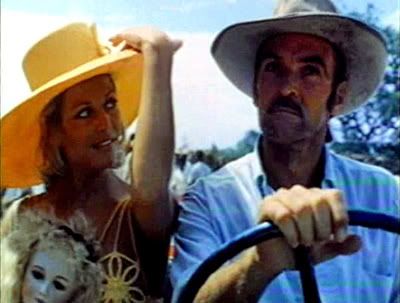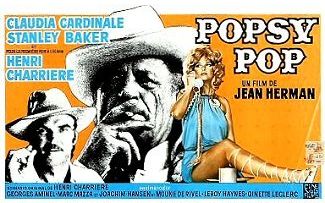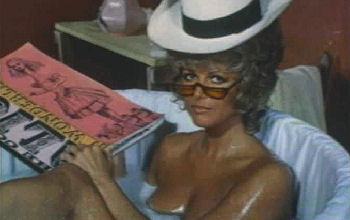From Monthly Film Bulletin, December 1974 (Vol. 41, No. 491). — J.R.

Popsy Pop (The 21 Carat Snatch)
France/Italy, 1970
Director: Jean Herman
Guiana. Plateau, Venezuela. In a ramshackle ‘boom town’, occupied by the natives who work the local diamond mine, the glamorous Popsy Pop arrives –ostensibly to divert the workers with her sexy cabaret act, but actually in order to distract Silva, the mine-company inspector, from a two-million-dollar diamond heist planned for the night of her arrival. Masterminded by Marcou, an ageing criminal who loves Popsy Pop, and carried out with the help of his henchmen Tormenta, Blanchette and Freddy -– who pilots the getaway helicopter — the robbery proceeds as planned: Silva is knocked unconscious in the singer’s dressing room and the diamonds are taken from the company office. But Popsv Pop and Freddy betray the rest of the gang by leaving without them. The angry workers kill Blanchette and Tormenta, but Silva persuades them to spare Marcou in the interests of recovering the diamonds — and offers the latter a cut of the reward in addition to a chance to avenge Popsy Pop’s double-cross. She has meanwhile taken a plane to Santa Domingo with Freddy, and places the diamonds in a safe deposit box, hiding the key in a jar of cold cream. By the time Silva and Marcou have caught up with Freddy, she has already approached evangelist Papa Legba to negotiate a sale. But Silva catches up with her before the deal has been closed, and forces her to walk barefoot through a stretch of wilderness until they reach the sea, where he finally goads her into revealing the diamonds’ whereabouts and. giving him the deposit box key. Marcou appears on the scene and Silva leaves the two of them together; as Marcou begins to caress Popsy Pop, it is not clear whether he intends to kill her or make love to her.
Written by and co-starring gruff and wizened Henri Charrière — the author of Papillon, who was apparently enlisted shortly after he became a celebrity — this conventional heist thriller manages to convey some pleasant old-fashioned atmospherics as long as it remains in the vicinity of the diamond outpost, where the robbery takes place. Barring a few bare breasts and subtitles, this entire segment could fit very snugly into any number of Hollywood banana-republic melodramas of the Forties or Fifties, with its lazy ambience of local relationships and exotic ‘color’ (mainly spirited folk music and dancing), its sleazy hotel, raucous bar and usually amiable natives. There’s also a certain flair to Claudia Cardinale’s ‘star’ entrance, when she appears in a bright yellow outfit clutching an oversize doll and Alice in Wonderland coloring book, and then coyly exchanges banter (including a Lewis Carroll quote) with Stanley Baker. Alas, once the outpost is abandoned, the film quickly deteriorates into mechanical cross-cutting and formula chase routines, and the promise of another spark of life from the intriguing Papa Legba (Georges Aminel) — whose public manner briefly suggests a fusion of Harry Belafonte and Liberace — is never fulfilled. The [thirteen minutes of] missing footage in the version under review may be partially responsible for the occasional lumpy continuity and loose narrative threads: Tormenta’s obsession with his two pocket watches works as a teaser for a character development that is never forthcoming, and one similarly regrets the early demise of Blanchette for cutting short Leroy Haynes’ likable performance. The peculiarly unresolved ending is even more off-putting, suggesting a desire to re-integrate Charrière into the plot without sufficient substance to make this shift of focus convincing. Previously figuring in the action more as an eminence grise than as a fleshed-out character, Charrière seems to take the story away from Baker and then roll it around in his fist, not knowing quite what to do with it.
JONATHAN ROSENBAUM



